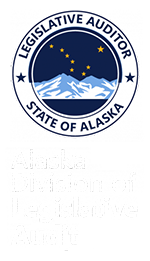| SUMMARY OF: | A Special Review of the Department of Health and Social Services, Medicaid and Children’s Health Insurance Program Transportation Costs |
Why DLA Performed This Audit
The audit was requested to identify total Medicaid and Children’s Health Insurance Program (CHIP) travel costs from FY 14 through December 2019, and ways to reduce costs. Audit objectives include identifying the most significant travel vendors and whether the State leveraged its purchasing power to reduce costs; reviewing the prior authorization process and system edits to ascertain whether the controls were operating effectively; testing a sample of travel transactions for reasonableness and proper support; and determining whether telehealth was used to reduce travel when possible.
Report Conclusions
The audit noted that a 2016 change in federal guidance allowed 100 percent federal reimbursement for services received by Alaska Native recipients through facilities operated by federal Indian Health Services or Tribes under specific circumstances. Prior to the change, the cost of Medicaid and CHIP transportation was shared equally between the state and federal governments. After the State implemented changes per the new federal guidance, the federal share of transportation expenditures grew to 92 percent during FY 17.
The audit concluded that Medicaid reforms were not implemented to expand the use of telehealth as required by statutes. Regardless, use of telehealth did increase; however, the increase was not significant. Regulations to expand the use of telehealth were considered, but not
published.
The most significant State-funded transportation vendor was Corporate Travel Management North America Inc. (CTM), the State’s travel contractor. Most of the payments to CTM were for airfares. Other than a contract with Alaska Airlines, which included certain discounts, no procurement efforts to reduce Medicaid and CHIP transportation costs were identified.
A total of 145 State-funded Medicaid and CHIP transportation claims were tested by auditors covering airfare, lodging, ground transportation, air ambulance, and ground ambulance. Testing found claims were generally supported, the prior authorization process was followed, and existing system edits appeared to be adequately designed to prevent improper transportation payments.
However, the following unallowable or unreasonable costs were detected.
• A Medicaid State Plan amendment approved in July 2016 authorized government-operated facilities to be reimbursed at federal per diem rates. This change was not federally required and allowed tribal owned lodging to be paid significantly higher rates than non-tribal owned lodging.
• Ten percent of taxi claims tested were overbilled.
• Three percent of ground ambulance claims tested were paid an incorrect rate. In addition, analysis of all ground ambulance claims during the audit period found 52 claims billed mileage in addition to an all-inclusive rate.
• Eleven percent of airfare claims tested found medical services may have been available in the home community. The Division of Health Care Services’ (DHCS) prior authorization process did not document an evaluation of whether services were available in a recipient’s home community.
The audit identified the following potential opportunities to reduce transportation costs:
• establishing fixed rates for certain taxi routes/areas;
• expanding access to transportation through ride sharing companies and/or through contracting for bus or shuttle services;
• allowing and promoting the use of public transportation;
• restructuring air and ground ambulance fees;
• reconsidering higher rates paid to lodging facilities owned by tribal organizations; and
• incentivizing the advance scheduling of non-urgent appointments to allow for the advance purchase of airfare.
Findings and Recommendations
- DHCS’s director should adopt regulations and implement written procedures to encourage the advance purchase or airfare.
- DHCS’s director should consider alternatives to the taxi voucher system.
- DHCS’s director should improve controls over ground ambulance claims.
- DHCS’s director should consider restructuring air and ground ambulance rates.
- DHCS’s director should adopt regulations and implement controls to evaluate the availability of medical services in a recipient’s home community prior to authorizing travel.
- DHCS’s director should consider specific opportunities to decrease transportation costs.
- DHCS’s director should implement regulations to expand the use of telehealth for primary care, behavioral health, and urgent care.

